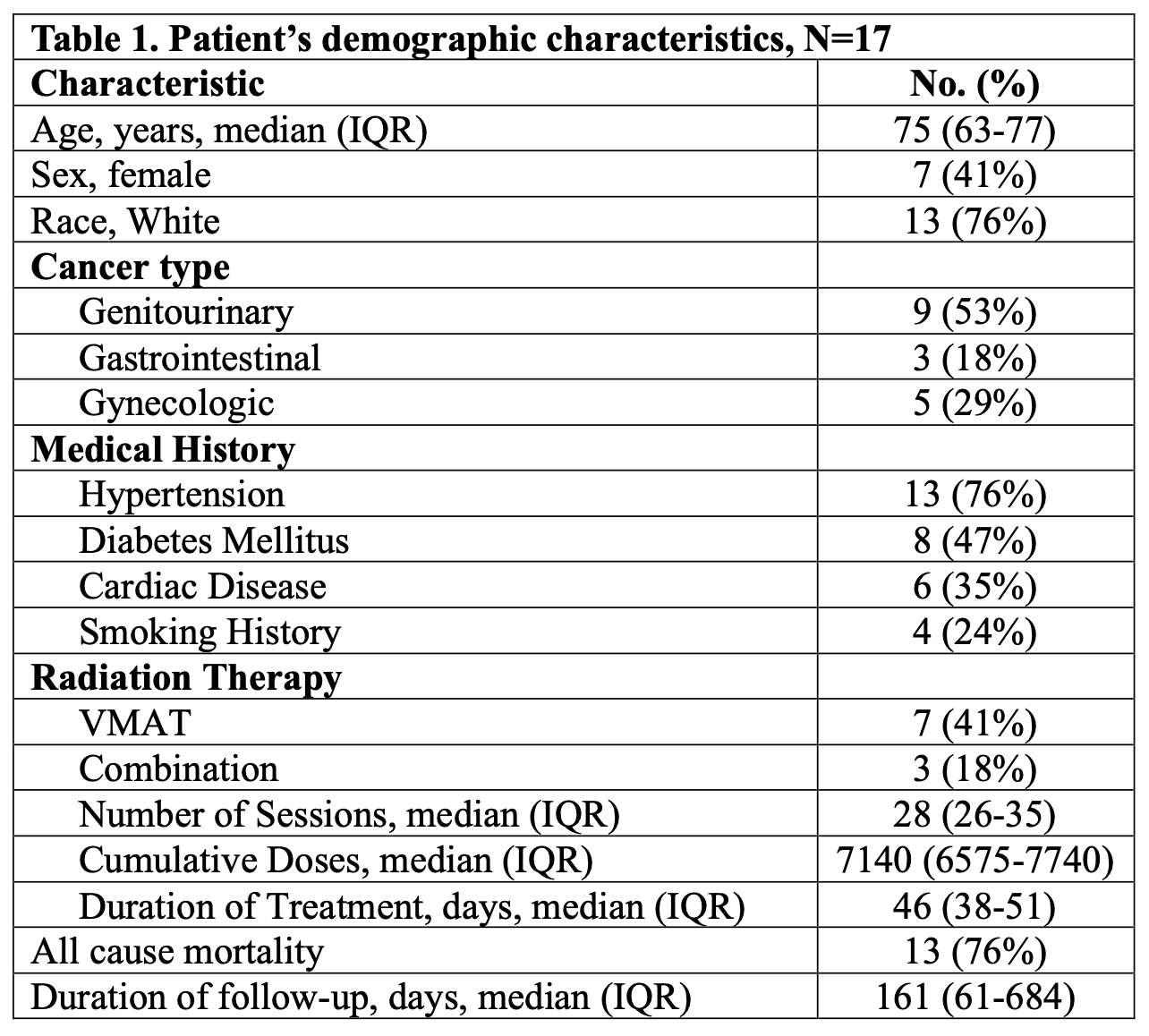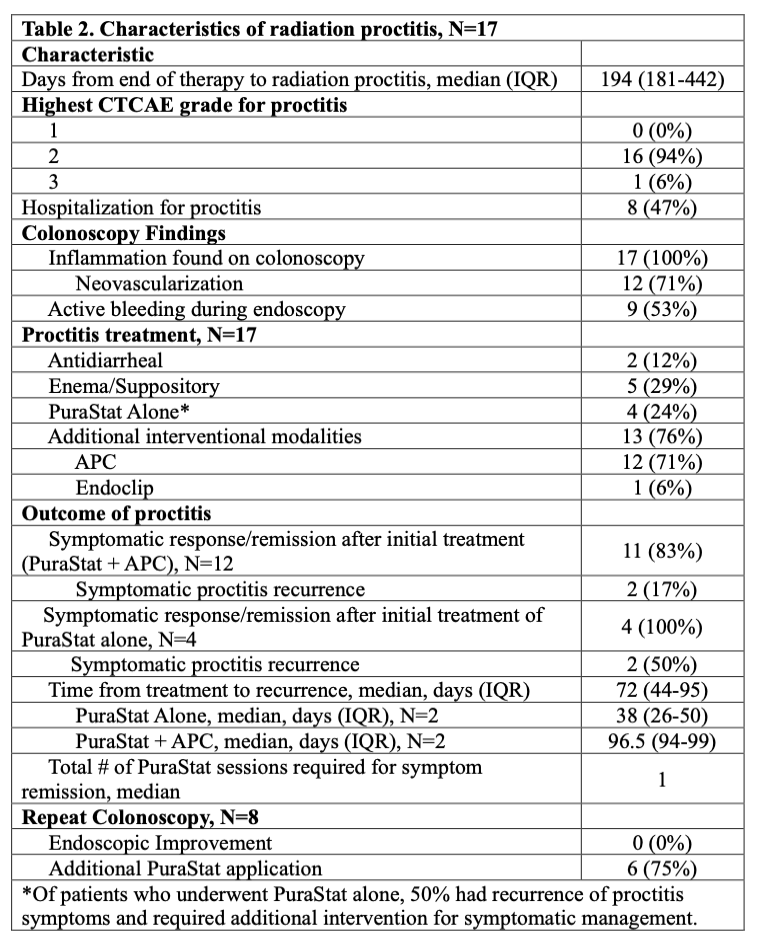Tuesday Poster Session
Category: GI Bleeding
P5186 - Implementation of PuraStat for the Treatment of Radiation Proctitis
Tuesday, October 28, 2025
10:30 AM - 4:00 PM PDT
Location: Exhibit Hall
- IL
Irene Lee, MD (she/her/hers)
Baylor College of Medicine
Houston, TX
Presenting Author(s)
Irene Lee, MD1, Yinghong Wang, MD, PhD, MS2
1Baylor College of Medicine, Houston, TX; 2University of Texas MD Anderson Cancer Center, Houston, TX
Introduction: Radiation proctitis is a common adverse effect of radiation therapy and significantly impacts quality of life. Many patients are managed with traditional hemostatic modalities such as Argon Plasma Coagulation (APC) with varying rates of symptomatic control (54% to 97%). In prior observational studies, serious complications, such as perforation or fistulation, requiring surgical intervention were reported in 6% to 13% of patients. Since 2014, topical self-assembling peptides (TSAP) have been widely adopted as a safe agent for hemostatic control in gastrointestinal bleeding (GIB); however, there is limited literature on the use of TSAP alone or in combination with APC to treat radiation proctitis.
Methods: This is a retrospective observational study of a single tertiary cancer care center, from July 2022 to February 2025, of patients with a confirmed diagnosis of radiation proctitis who were treated with TSAP for symptomatic management.
Results: Among 332 patients who received TSAP treatment during the study window, 17 met inclusion criteria (76% Caucasian; 41% female; median age 75 years); 100% reported bloody stool as the predominant symptom. Neovascularization was the most frequent finding on endoscopy (71%) and 9 patients (53%) had active bleeding during endoscopy. 4 patients (24%) received TSAP monotherapy while 76% achieved hemostasis in combination with APC. 82% of patients achieved symptomatic remission after treatment though 24% reported symptomatic recurrence at a median of 72 days after initial intervention. TSAP monotherapy appeared to have higher efficacy (100% vs 83%), but higher recurrence (50% vs 17%) compared to combination regimen with shorter median period until symptomatic recurrence (38 days vs 96.5 days). 8 patients (47%) underwent subsequent surveillance colonoscopy with 75% receiving additional TSAP. None of the patients experienced serious complications associated with treatment that required surgical intervention during the study period.
Discussion: PuraStat is a promising, safe modality for the treatment of radiation proctitis associated GIB at high efficacy but high recurrence. The combination of TSAP with APC could serve as efficacious treatment with presumed expedited mucosal healing, durable effect and minimal serious complications. Further research is needed to determine the efficacy of TSAP monotherapy and in combination with APC for short-term symptom management and long-term mucosal healing of radiation-induced proctitis.

Figure: Table 1. Patient Demographic Characteristics

Figure: Table 2. Characteristics of Radiation Proctitis
Disclosures:
Irene Lee indicated no relevant financial relationships.
Yinghong Wang indicated no relevant financial relationships.
Irene Lee, MD1, Yinghong Wang, MD, PhD, MS2. P5186 - Implementation of PuraStat for the Treatment of Radiation Proctitis, ACG 2025 Annual Scientific Meeting Abstracts. Phoenix, AZ: American College of Gastroenterology.
1Baylor College of Medicine, Houston, TX; 2University of Texas MD Anderson Cancer Center, Houston, TX
Introduction: Radiation proctitis is a common adverse effect of radiation therapy and significantly impacts quality of life. Many patients are managed with traditional hemostatic modalities such as Argon Plasma Coagulation (APC) with varying rates of symptomatic control (54% to 97%). In prior observational studies, serious complications, such as perforation or fistulation, requiring surgical intervention were reported in 6% to 13% of patients. Since 2014, topical self-assembling peptides (TSAP) have been widely adopted as a safe agent for hemostatic control in gastrointestinal bleeding (GIB); however, there is limited literature on the use of TSAP alone or in combination with APC to treat radiation proctitis.
Methods: This is a retrospective observational study of a single tertiary cancer care center, from July 2022 to February 2025, of patients with a confirmed diagnosis of radiation proctitis who were treated with TSAP for symptomatic management.
Results: Among 332 patients who received TSAP treatment during the study window, 17 met inclusion criteria (76% Caucasian; 41% female; median age 75 years); 100% reported bloody stool as the predominant symptom. Neovascularization was the most frequent finding on endoscopy (71%) and 9 patients (53%) had active bleeding during endoscopy. 4 patients (24%) received TSAP monotherapy while 76% achieved hemostasis in combination with APC. 82% of patients achieved symptomatic remission after treatment though 24% reported symptomatic recurrence at a median of 72 days after initial intervention. TSAP monotherapy appeared to have higher efficacy (100% vs 83%), but higher recurrence (50% vs 17%) compared to combination regimen with shorter median period until symptomatic recurrence (38 days vs 96.5 days). 8 patients (47%) underwent subsequent surveillance colonoscopy with 75% receiving additional TSAP. None of the patients experienced serious complications associated with treatment that required surgical intervention during the study period.
Discussion: PuraStat is a promising, safe modality for the treatment of radiation proctitis associated GIB at high efficacy but high recurrence. The combination of TSAP with APC could serve as efficacious treatment with presumed expedited mucosal healing, durable effect and minimal serious complications. Further research is needed to determine the efficacy of TSAP monotherapy and in combination with APC for short-term symptom management and long-term mucosal healing of radiation-induced proctitis.

Figure: Table 1. Patient Demographic Characteristics

Figure: Table 2. Characteristics of Radiation Proctitis
Disclosures:
Irene Lee indicated no relevant financial relationships.
Yinghong Wang indicated no relevant financial relationships.
Irene Lee, MD1, Yinghong Wang, MD, PhD, MS2. P5186 - Implementation of PuraStat for the Treatment of Radiation Proctitis, ACG 2025 Annual Scientific Meeting Abstracts. Phoenix, AZ: American College of Gastroenterology.
